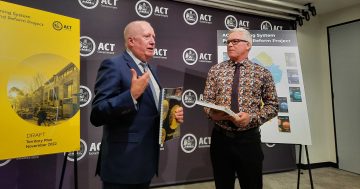
Planning and Land Management Minister Mick Gentleman: the government is committed to making the planning system accessible and easy to navigate. Photo: Region Media.
ACT Planning Ministers will lose their development call-in powers and the pre-DA community consultation process will be scrapped under the draft Planning Bill released today for public consultation.
Other key changes include the removal of exemptions for Environmental Impact Statements and the creation of a Significant Development category as part of moves to build a better planning system.
The ACT Government’s reform process intends to replace the current rules-based system with one that is more flexible, less prescriptive and outcomes-focused, with speedier and more efficient development application assessments and more transparency.
Many of the changes were flagged last year, including a new object for the bill that features wellbeing, ecological sustainability and liveability principles, and recognises the knowledge, traditions and culture of the Ngunnawal people as the traditional custodians of the land.
The draft bill removes the three assessment tracks for a simpler process.
While Planning Ministers will no longer be able to call in a development, they will be able to declare a proposal a Territory Priority Project, where it is critical to infrastructure and facilities, has a significant public benefit and there is a need to avoid delay.
There will also need to have been sufficient community consultation on the proposal.
The aim is to provide certainty and remove politics from the development approval decision, which will now rest solely with the Chief Planner.
A decision to declare a proposal a Territory Priority Project would have to be made before a DA was lodged and most were expected to be public projects such as the hospital expansion.
There would still be no third party appeals to ACAT, but access to the ACT Supreme Court would still be available.
The government believes the pre-DA consultation isn’t working and not achieving the intended results. It will be replaced by new ‘principles of good consultation’ that will mean a more transparent process for both proponents and the community.
The set of principles in the draft bill are drawn from South Australian legislation but adapted to the ACT context, and recognises community engagement as part of best practice planning. The Planning Minister will also be able to make guidelines for the “principles of good consultation”.
Under the draft bill, the Planning Authority will be able to advise proponents about where a proposal is falling short and what they could do about it.
The government says the idea is not just to help proponents get their approvals but improve proposals and achieve better development outcomes.
All communication with proponents will also be posted on the Planning website so the community can track the conversation, along with all other DA documents.
The new category of significant development will cover those that require an environmental impact statement, estate development plans or advice from the design review panel.
These major developments will have additional documentation or process requirements for DAs and an additional period of 10 working days public notification and time to decide the DA.
The government says the EIS exemption process had morphed over the years to be very similar to the EIS process, without the certainty provided from an initial scoping document.
Under the draft bill, the ability to rely on recent studies will be retained, but all EIS processes will be required to start with a scoping of potential environmental impacts.
The bill also reinforces a presumption that any DA amendment requires additional consultation and time to decide whether the DA will start again when amended.
A separate regulation will cover developments that are exempt from the DA process, so they are more accessible to heavy users such as building designers, architects and certifiers, and homeowners.
Planning and Land Management Minister Mick Gentleman said the government was committed to putting people at the heart of planning decisions by making the planning system accessible and easy to navigate.
“The draft Planning Bill has been developed in consultation with community and industry stakeholders – including targeted engagement throughout 2021 – to discuss and test key policy issues within the legislation,” Mr Gentleman said.
The draft bill marked the start of the next stage in the project, shifting from the ‘review’ to ‘reform’ phase of work.
“Clear provisions for achieving these outcomes in the bill will support a reformed planning system that encourages the right type of investment and development, rather than impose barriers,” Mr Gentleman said.
The draft bill also prepares the way for a new Territory Plan, and it and the new District Strategies will be released later in the year for comment.
The planning and land authority will be renamed the Territory Planning Authority.
The draft bill is available for public consultation through the Planning System Review and Reform YourSay Page for three months from 16 March to Wednesday, 15 June.

















